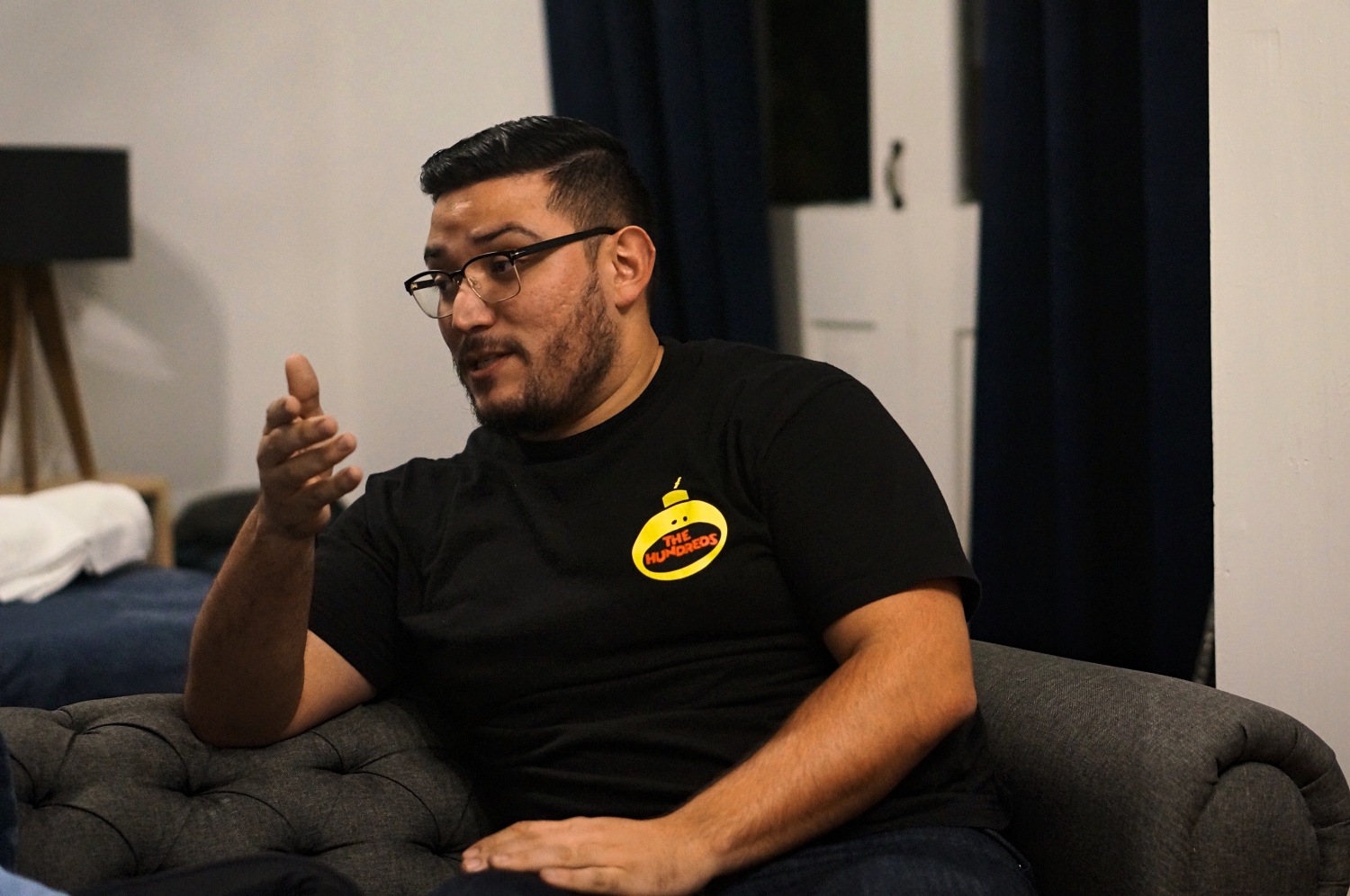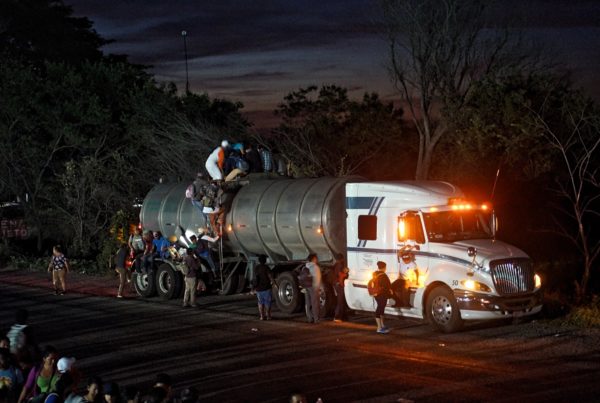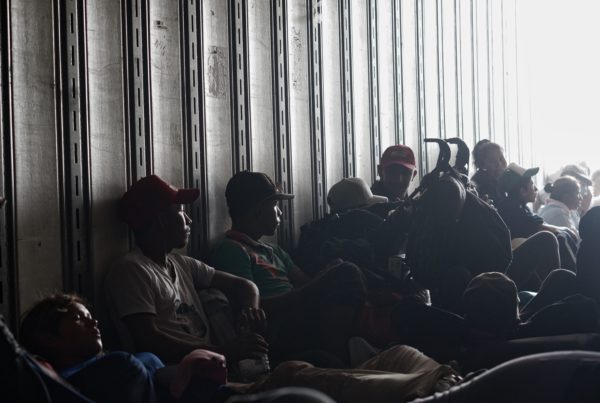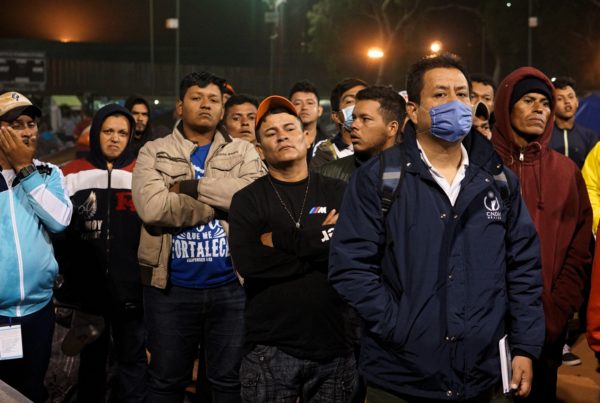John is a friend of mine who I met in Mexico City. He is an American citizen, born and bred. But his entire family migrated to the US from El Salvador.
When John heard that I was visiting the migrant caravan in Mexico City, he asked if he could join. His whole life he grew up hearing stories about people migrating from El Salvador to the US. Now he had the chance to witness this process firsthand.
“Had circumstances been different my family could’ve stayed in El Salvador and that could very well be me trying to come to the US for an opportunity. It’s wild how these small decisions drastically changed my life,” John says.
John’s maternal grandfather worked as a farmer on other people’s land until he saved enough money to buy his own plot. John’s grandparents and their 10 children lived in a tin shack which used newspapers as insolation for the walls. The biggest building in their town was a train station. They didn’t have electricity in their home and they were better off than John’s dad’s family.
John’s family decided to come to the US on a whim. His aunt was already living in the Washington DC area and she told John’s mum about the opportunities. His mum flew into the US after arranging a visa and stayed there. His dad was working on merchant ships and border security wasn’t as tight as it is now. His ship stopped in Baltimore and when he stepped off the merchant ship he never returned to the boat. John’s older sister, who was born in El Salvador, was left behind with John’s grandmother. His parents wanted to see what the US was like before relocating her. They didn’t want to put her through the hardships of the move. They came to the US with just the clothes on their back.
Once they had established themselves, John’s mum sent money to his grandmother to finance his sister’s journey. One of the friends of the neighbourhood was travelling to the US by land and John’s sister went with them. His sister was only 6 years old but she still vividly remembers the trip. She walked and took trucks all the way to the Mexico-US border. They crossed the border in a dump truck. The people crouched down and the smugglers put wooden boards over them and threw dirt on top of the boards to hide them from view. It was difficult for her to breath and she was afraid of being caught. Nowadays she’s a US citizen, she’s educated, and she has a good job. But she still thinks about that trip.
John’s parents didn’t become citizens until the late ‘80s during the amnesty period of the Reagan administration. But John’s family isn’t grateful to Reagan. The Reagan administration supported and financed the military-led government during the El Salvador civil war which decimated the country and killed thousands of civilians.
The rest of John’s family slowly migrated to the US. The family would save money, send it home, and bring another family member over. John’s grandmother had 10 children: 5 girls, 5 boys. The first 6 children entered the US undocumented. His aunt, who was the first person from his family to arrive in the US, petitioned for the other 4 children to come to the States. It took years but eventually they were given residency. John’s uncles arrived as teenagers and went to high school in the US. John’s whole family lived together in an apartment for a long time before they built the financial base for themselves to move out.
Nowadays, his dad drives commercial garbage trucks. For a long time he was a long haul truck driver. It was good money but the work hours were hard on the family. He would leave on Sunday and come back on Friday. During the summer vacations John would join his dad in the truck for a week. These were pre-cell phone days so all they did was talk.
“My dad was seven when his dad left. His family were so poor that on the rare occasion his mum drank a Coca Cola, he used to swill her backwash just so he could get the flavour. To him it was a delicious treat.”
When John’s mum first moved to the US she cleaned houses for a living. When she became a citizen and had learned English she started working as a custodian at a museum in Washington DC. That makes her officially a US government employee. She’s been working there for 20 years.
John’s parents achieved the classic American dream. From undocumented migrants to buying their first home together. Their children went to college and now they live in a safe neighbourhood.
“It’s surreal hearing the stories of my family, seeing where we have come from to where we are. It’s humbling. A lot of people don’t appreciate just how much effort and perseverance and hope it took them to get to where they are today.”
John’s dad would love to go back to El Salvador. In his dad’s mind, El Salvador is still his home. He still owns a house and has siblings there. He has nostalgia for the country he grew up in. John’s mum doesn’t feel the same way. Her whole family live in the US. John doesn’t foresee them ever going back, especially considering the gang violence in El Salvador.
John spent the next few days visiting the caravan with me, speaking to people. Considering his background it is no surprise he is empathetic to their stories.
“I completely understand why you would risk your life to come to the United States. It makes perfect sense. If your back is against the wall, you have no economic opportunities, gang violence is knocking at your door, what do you do? You take the only out that you have even if the risk of something happening is high. You drastically change not just your life, but the life of the people you leave behind. Your brothers, sisters, kids, mothers, fathers, whose lives are drastically going to improve as well by this person taking the risk.”
John was surprised but encouraged by the positive, hopeful atmosphere in the caravan. The stories he heard of his family’s experiences were much darker. He thought the people would be more terrified. But he believes they see power in their numbers. He thinks this makes it easier for the families and children. But he is not optimistic. While we are visiting the caravan, US media is reporting on Trump sending 15,000 troops to the border.
“I see a lot of myself, a lot of my cousins, in those kids trying to get to the US. I just hope they make it. I’m rooting for them.”



